




The St. Louis American Foundation shares the goal of all who seek to ensure adequate, affordable health care for all –underserved communities in particular. The Foundation will again recognize, highlight and express appreciation to some of the St. Louis region’s leading African-American health care providers who are making a difference at the 11th Annual Salute to Excellence in Health Care Awards and Recognition Luncheon on April 24. We are delighted with the continuing, broad community acceptance and support of the luncheon as part of an ongoing effort to provide relevant health education information for African Americans, as well as encourage the pursuit of the varied opportunities in the health care field.
Adetailed report released by the St. Louis Regional Health Commission highlighted the failure of our health care safety net to provide for the region’s medically underserved. In the midst of irrefutable data documenting the system’s operational inefficiencies, perennial underfunding and missed opportunities for collaboration of safety net organizations, the report also indentified an oasis of community health organizations and devoted health care providers who are striving to dismantle the systematic and nearly insur-
mountable barriers to health care for the indigent and underinsured. These tremendously committed and passionate health care leaders have an unwavering devotion to the community and share the moral conviction that they cannot afford to stand idle while so many suffer from preventable illnesses.
Our 2011 Salute to Excellence in
care are admired by their colleagues as well as their patients.
All of the outstanding men and women in health care, represented by our awardees, understand that within our “world class” health care system, every patient should be treated with dignity and respect and deserves the highest quality of health care available. Every patient
All of the outstanding men and women in health care, represented by our awardees, understand that within our “world class”health care system, every patient should be treated with dignity and respect and deserves the highest quality of health care available.
Health Care awardees share these values. Their productive careers exemplify what’s right with health care in St. Louis. Dreamers and selfless practitioners, they do more than offer the rhetoric of “leave no one behind.”
Jonathan Reed, M.D. has had an outstanding career of providing compassionate service to his patients. Teri Murray, Ph.D., R.N. and Vetta Sanders Thompson, Ph.D. are current trailblazers for future generations to follow. Their dedication and commitment to excellence in health
should be treated with dignity and respect and deserves the highest quality of care available. They inspire our youth to pursue careers in science and medicine and offer a refreshing view on how a dysfunctional health care system can be reformed. Also common among them is the belief that community-based programs will have the most profound impact on eliminating racial health disparities, They support the approach we must all take if we are sincere about providing universal access to health care.
The eleventh annual
And we are unequivocal advocates for universal, quality health care. Inspired by the positive attitudes and commitment to service of our honorees, the St. Louis American Foundation affirms that health care is indeed a fundamental right, and that good health care is best rendered in neighborhood settings by compassionate providers who know, respect and love their community. With our Salute to Excellence in Health Care awardees as standard bearers, we embrace the existing, effective, community-based health programs in St. Louis, while adopting the best community health practices from other American cities. This simple yet powerful message should be readily adopted as we endeavor to eliminate disparities in HIV/ AIDS, cardiovascular disease, cancer, diabetes and other chronic illnesses. Yet, the greatest agent for social change and a healthy community has been, and will always be, an invalued, focused revitalized African-American community and the more forward-thinking health care leaders who move within it.
Donald M. Suggs President
St. Louis American Foundation
Presented by the St.Louis American Foundation
2011 Lifetime Achiever in Health Care
Jonathan R. Reed, M.D.
2011 Stellar Performer in Health Care
Teri A. Murray, Ph.D., RN
2011 Excellence in Public Health Awardee
Vetta Sanders Thompson, Ph.D.
Health Care Advocacy Organization of the Year BESt Pharmacy SummerInstitute
2011 Excellence in Health Care Awardees
Christal L. Adams, RN, BSN
Portialyn Y. Peterson, MSW, LCSW
Clara Scott, MSW
Darlene Smith
Katina McLeod-Stewart, MHA
Mary J. Trice, RN, BSN, MHS
Debbie Wade-Wilson, RN, BSN
Deirdre ‘Dee’Washington, RN
PARTICIPATING SPONSORS:
Gold Sponsors
• Barnes Jewish Hospital
• Centene Corp.
• Christian Hospital
• SSM Health Care
Silver Sponsors
• BJC HealthCare
• Express Scripts
• St. Louis College of Pharmacy
Bronze Sponsors
• UCM Partners
• Washington University
Brown School of Social Work
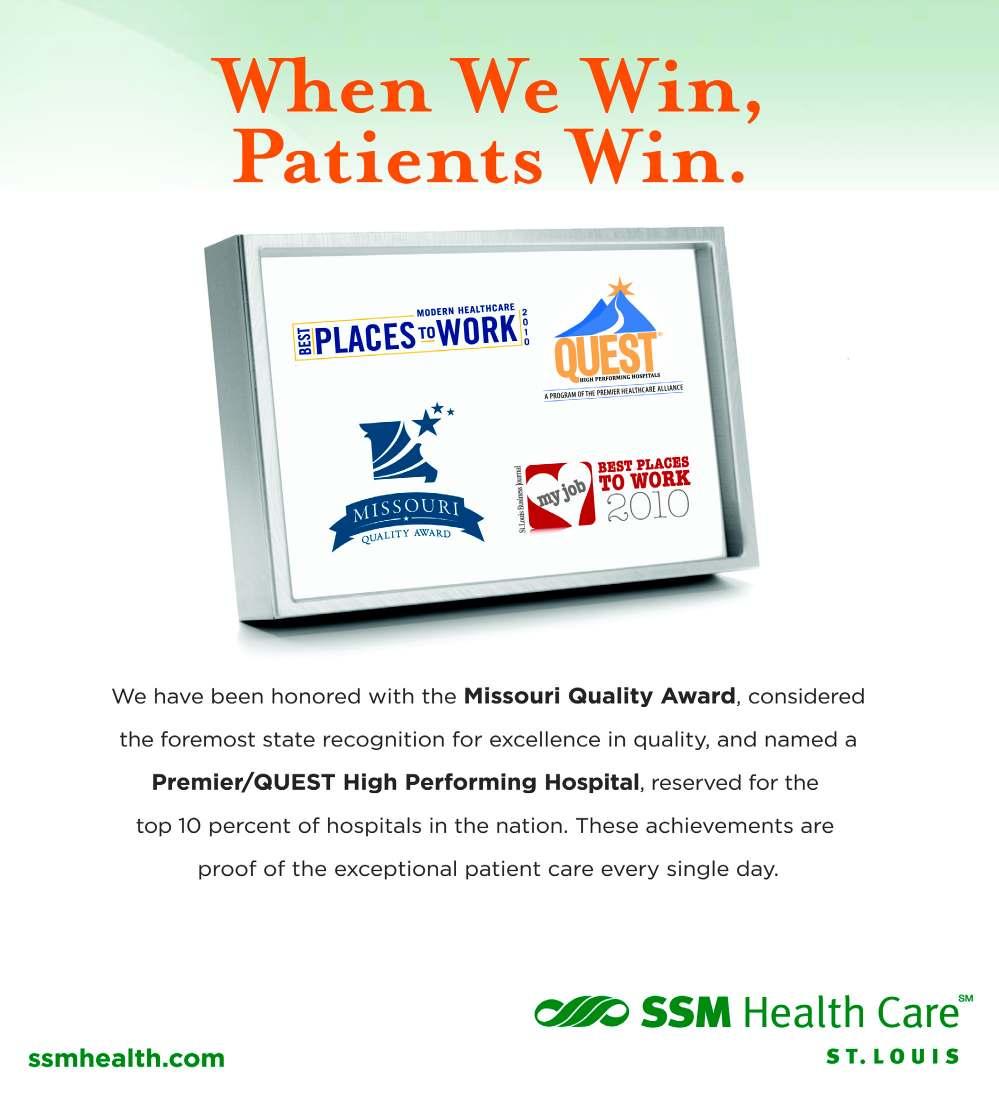
By Andrew Fowler
For the St.Louis American
Christal Adams is a registered nurse at Barnes-Jewish Hospital. She has been working there for about 11 years and has always known that nursing was the career for her. Her love for people and the human body is evident in all of her work in and out of the hospital.
Adams’earliest influence that led her to become a medical professional was her mother. Adams watched as her mother worked as a nurse’s aide for a team of visiting nurses.
“Her dedication to the health profession sparked an interest in me,” Adams said.
Adams first attended Jackson State University in Mississippi to get her undergraduate degree in biology. She was fascinated with the human body.
“To me the body is an amazing thing,” Adams said. “If people can learn about the body, they can take charge of their health.”
That interest in people’s health led Adams to rethink the career path she wanted to take.
“I’m not the type of person that can
sit at a computer all day,” Adams said. “I love working with people and interacting with people.”
Adams changed her major to align with her goal to help and interact with those in her community and graduated from Jackson State University with a
degree in nursing.
“I’ve always wanted to be in the medical profession,” Adams said. “After I graduated from Jackson State, I worked at Planned Parenthood, where I worked with nurse practitioners who showed me a lot of things.”
As her love for nursing grew, she wanted to expand her impact on the community. After Adams started working at Barnes-Jewish Hospital, she began taking advantage of offered educational opportunities through the hospital.
Adams is currently working toward her
master’s degree in nursing through the Goldfarb School at Barnes-Jewish College. She will complete her work toward her master’s degree this August and in the upcoming year she plans to become an Adult Nurse Practitioner.
Adams’health practices extend beyond the hospital through her several community activities. She is a member if Chi Eta Phi Sorority, Inc., a professional sorority for nurses. Through the Rho chapter of the organization she serves the community by providing HIV/AIDS and drug prevention education.
Adams also mentors nursing students as the lead coordinator of a mentoring program at St. Louis Community College – Florissant Valley.
As a member of Christ Our Redeemer AME church, Adams serves as the health ministry leader.
“Through the health ministry, we provide health information to the congregation and the community,” Adams said.
Adams participates in Faith Communities United, a collaboration of churches dedicated to going out into the African American community to offer
See ADAMS, page 26

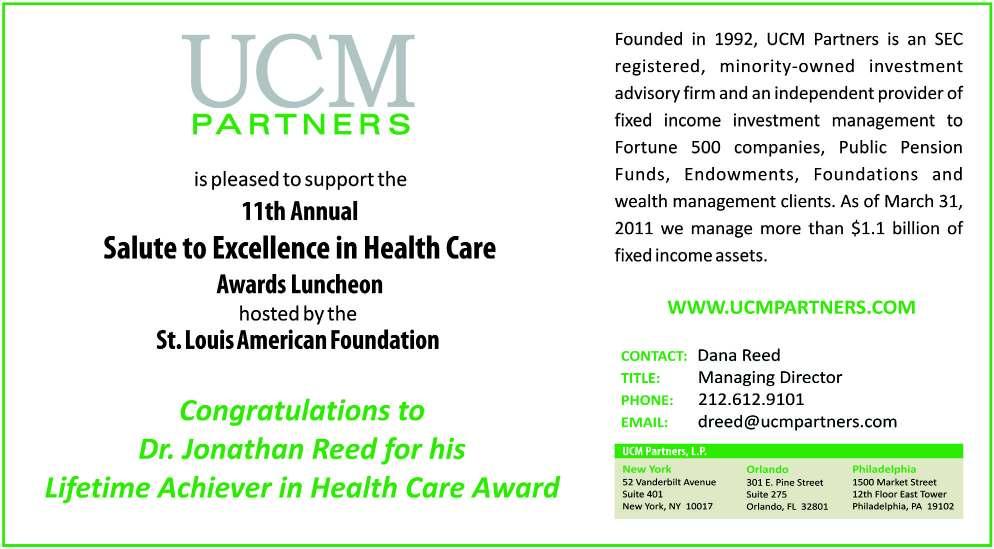
By Andrew Fowler
For the St.Louis American
Portialyn Peterson is the lead social worker at SSM Behavioral Health Services DePaul. Her path to the medical field was not a sure thing at first, but once she decided to go in that direction, she knew it was a perfect fit.
“I’ve always been helpful with problem solving with my friends,” Peterson said. “I love being of service to others.”
Growing up, Peterson did not always plan on going into the medical field, but her upbringing would eventually have a huge impact on her decision to go into social work.
“From the time we were children we were always taught and expected to help others,” Peterson said. “I think that coming into social work was natural to continue helping others.”
Peterson attended Drake University in Des Moines, Iowa and graduated with a double major in both journalism and sociology. After receiving her undergraduate degree Peterson decided to get her law degree.
“I did a year of law school after college and did not like that at all,” Peterson said. “I remember having an internship in
law school and feeling that I cannot do this. I’ve never felt that way [at DePaul].”
After her year in law school, Peterson made the difficult transition and enrolled in Saint Louis University’s Social Work Master’s program with a family specialization, where she decided to work in mental health. She has been at SSM
DePaul for about three years working with children and serving in the pre-adolescent inpatient psychiatric unit.
“I like working with children and families,” Peterson said. “If you catch children young enough and give them adequate treatment they will grow up to be healthy and stable.”
Peterson was chosen to be a part of last year’s Emerging Leaders program. The program gathers leaders from several SSM departments throughout the different branches. For her Emerging
Leaders program project, Peterson focused on programming and creating a single treatment modality to unify each treatment unit. As a part of the pre-adolescent unit, Peterson was quick to offer solutions to make the programming within the unit more effective and is currently working on implementing those changes in the adolescent unit, with plans to introduce the treatment modality to each unit.
While she is making great contributions to SSM DePaul, Peterson has also been working to help her community. Peterson sits on the Young Professionals Board in St. Louis, where they promote and raise funds for children in need in the area. She is also a member of the National Association of Social Workers and an active member of her church, First Baptist Church of O’Fallon.
As she was going through her transition from law to social work, Peterson was encouraged by a Maya Angelou quote, which continues to inspire her to this day.
“Success is liking yourself- liking what you do and liking how you do it. I think that sums up my transition and feeling successful in this field,” Peterson said.


By Andrew Fowler
For the St.Louis American
Clara Scott is a medical social worker at Betty Jean Kerr People’s Health Centers. She is the longest employed member of the health center’s staff. Scott has a love for her community and is determined to help that community as she performs a job that she loves.
Scott wanted to be in the medical profession since she was a young child. Her mother had a large influence on her decision and her desire to be a part of the medical field and it never diminished.
“I remember asking for medical kits every Christmas,” Scott said. “My mother wanted to work in the medical field. She loved to help people.”
Along with her mother’s influence, Scott knew that she wanted to have a lasting impact in the St. Louis community, which is something that still fuels Scott today as she works in mental health.
“I saw the need in our community and I just wanted to give back,” Scott said. “I just never lost that interest of wanting to work in the medical field.”
Scott first attended Forest Park
Community College out of high school. She received her Bachelor’s degree in Social Work from the University of Missouri – St. Louis. As a student, Scott began to work as a volunteer for People’s Health Centers and was hired for a staff position in 1983. She has been employed at the health center for 28 years.
During her tenure at People’s Health Centers, she was persuaded to go back to school to obtain her Master’s degree in from UMSL. After obtaining her Master’s, Scott stayed with People’s Health Centers, continuing to be touched by the influence of Betty Jean Kerr.
“Her vision and my vision connected. We provide quality health care that made a difference. I was inspired by her efforts,” Scott said. “I was always brainstorming ways for prevention and Ms. Kerr was always open to listening to my
“I saw the need in our community and I just wanted to give back.I just never lost that interest of wanting to work in the medical field.”
– Clara Scott
ideas.”
One of Scott’s ideas was implementing and organizing an appointment system for the health center. This ensured that the center would run smoothly and it increased the center’s efficiency as the number of patients in the clinic doubled. Along with her duties as a mental health provider, Scott also works as a prenatal case manager, working to help women with their pregnancies; a certified chemical dependency officer, where she works with substance abuse clients; an HIVofficer; and she coordinates the homeless program for the health center.


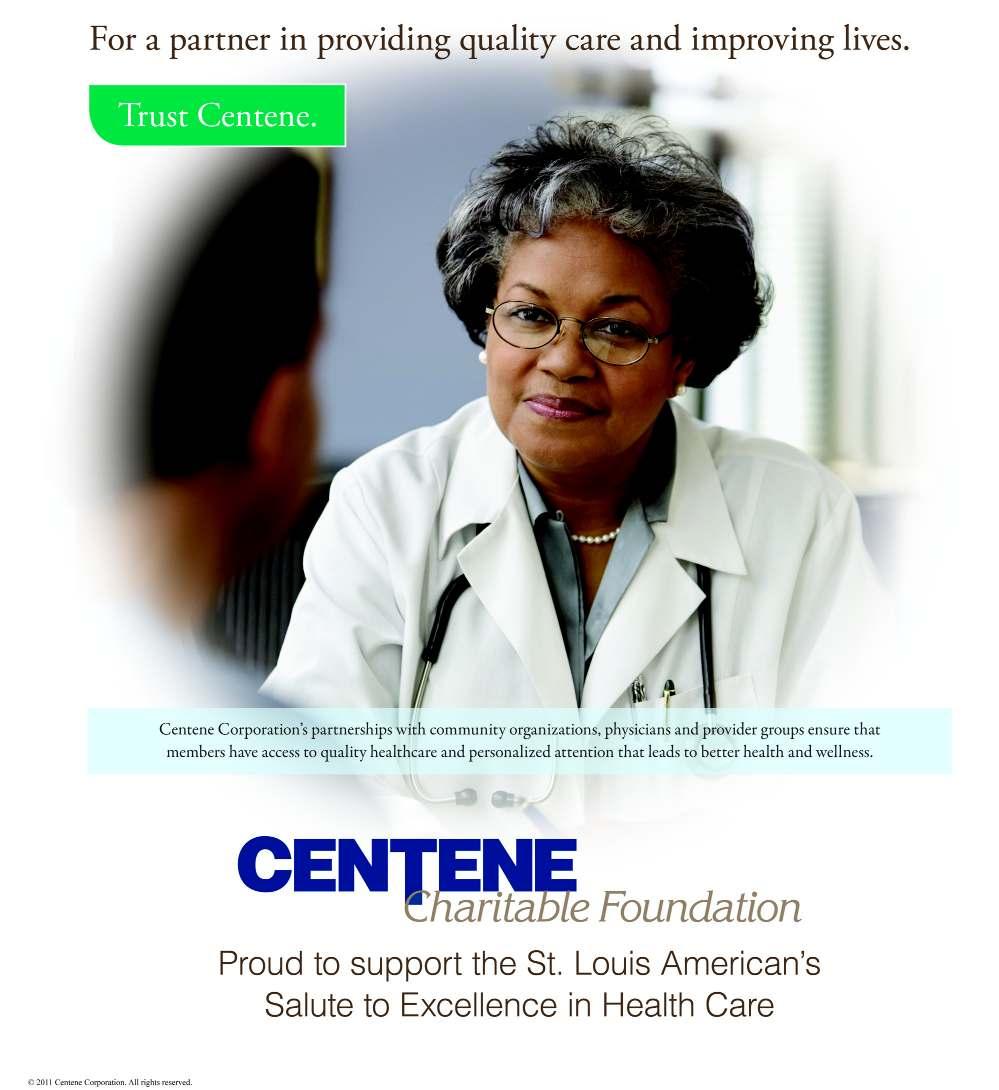
By Andrew Fowler
For the St.Louis American
Darlene Smith is a mental health counselor for SSM St. Mary’s Health Center. She has been a practicing therapist for 30 years, but health care was not always the sure path Smith was planning to take.
Smith comes from a family of educators. Her mother was in education and Smith’s three sisters all taught for the St. Louis Public Schools.
“Even as a child I knew the importance of teaching. So my teaching ability and skills were evident early on,” Smith said.
Smith attended Harris Stowe State University and graduated with a degree in elementary education and with a psychology minor. She had set out to go into education like the other women in her family, but along with teaching, Smith had another passion.
“My first interest was wondering why people act the way they do,” Smith said. “So I wanted to study the behavior of people.”
Smith attended Washington University
to receive her master’s degree in psychology, which jump-started her career in mental health as a licensed professional counselor. Smith began working with behaviorally-disordered children who had been put out of their regular school. She then began to work with substance
abuse clients. Currently she works with patients who are mentally ill, which could include illnesses from bipolar disorder to schizophrenia.
“Well mainly I help to bring [clients] some hope and some self-discovery,” Smith said. “I help increase their selfesteem and teach them to make goals for themselves.”
One quality that co-workers have come to see in Smith is how much she cares for the clients she works with. This is evident in the innovative ways that she
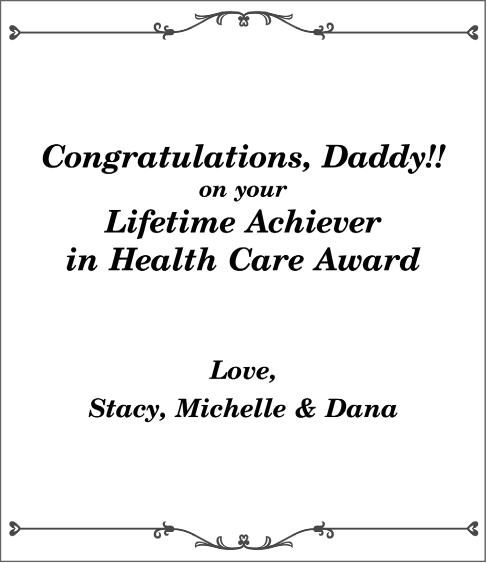
creates for individual and group sessions. Because treatment is often repetitive, Smith recognized the need to make treatment more enjoyable for clients.
“I do it creatively where they can learn things in a fun and nonthreatening way,” Smith said.
Smith was asked to join with other program leaders within St. Mary’s and other SSM health centers to revamp and improve the curriculum. Through the program, Smith was able to create new innovative ways to enhance client interaction. She was a key organizational factor for the entire group and was vital in securing resources to expand curriculum.
An experience that demonstrated how much Smith cared for her clients was during this past Christmas. The center’s budget for purchasing gifts for clients is limited to about $3 per person. Smith found items that were within the range of the budget and allowed each client to choose what gift they wanted. The gesture made a big impact.
“It was empowering and validating for them to choose,” Smith said. “It
See SMITH, page 26

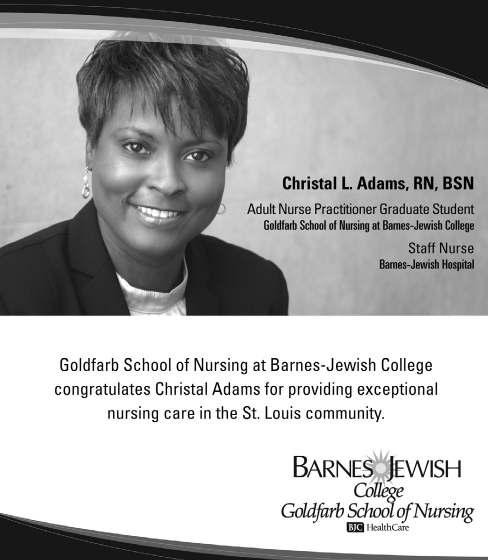
By Sandra Jordan Of The St.Louis American
Katina McLeod-Stewart, MHAis the health services manager for the St. Louis city Health Department. Starting off as a supervisor in the maternal child and family health clinic in 1997, impressive work results earned Stewart promotions to program manager, and clinic supervisor.
In 2000, she became an inspector in the Air Pollution Control Division and was promoted to section chief. As such, she “completely reorganized the asbestos inspection process, which eliminated illegal asbestos abatement projects within the City of St. Louis,” her nominator said.
It was her work with mothers, children and families in the health clinic that sealed her desire to work in health administration.
“I worked with a lot of underinsured patients that would come into the clinic for immunizations as well as lead testing for their children – and just seeing that disconnect with services that they needed – that’s really what made me get involved,” McLeod-Stewart says. “That’s what kind of motivates me; when I empower people to make them healthy and whole – be it physically and emo-
tionally. It’s just having that whole wellrounded individual – just connecting them with the resources they need in order to better themselves.”
McLeod-Stewart has been the health services manager for five years, overseeing the day-to-day administrative, operational and financial activities of the
department. Stewart initiated automation of the managed-care billing system – at a time and cost savings for the clinic.
“I deal with all of the accounts payable, accounts receivable; I negotiate contracts; ensure compliance with various contracts,” she explains. “I also serve as a liaison for various outside organizations like Grace Hill, the American Lung Association, just making those connections to make sure that our program is seen in a visible light.”
Collaborations allow the health department to offer patient care through two public health centers in St. Louis.
The HIVand STD clinic is through St. Louis ConnectCare and other patient care is through Grace Hill Neighborhood Health Centers.
“They receive education from the health department but actual patient care is done through ConnectCare and Grace Hill,” she says.
McLeod-Stewart earned a Bachelor of Science in health administration from Harris Stowe State University and a Master of Science in health administration from Webster University.
Stewart is also a part of the Missouri Public Health Leadership Institute and collaborates with several organizations in the community.
Apersonal commitment to wellness of the entire person led McLeod-Stewart and some friends to found the non-profit organization, “Looking Beyond.”
“We try to encourage a total person wellness, and it’s by pushing prevention education to the St. Louis community,” McLeod-Steward says. “Alot of things that we really try to do is work toward eliminating HIV/AIDS; STDs; any physical and mental abuse; substance abuse; delinquencies in the youth population.”
Their launch event was held earlier
See STEWART, page 24

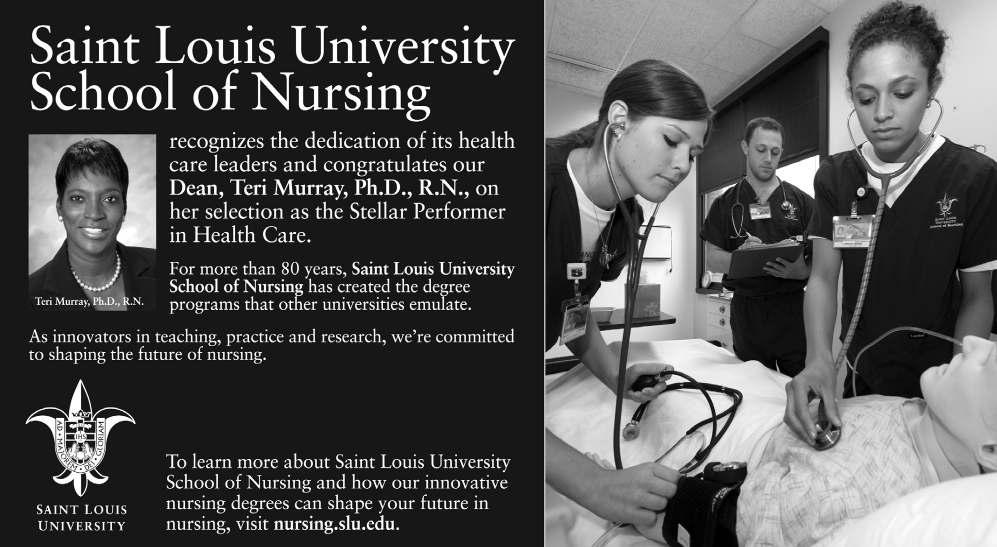
By Sandra Jordan Of The St.Louis American
After 37 years with Christian Hospital in North St. Louis County, a massive amount of institutional history resides within Salute to Excellence in Health Care Awardee Mary Trice RN, BSN, MHS. Trice is director of surgical services at Christian Hospital and says it has always been a very good place to work.
“I stayed at Christian just because it became family to me. I started as a nurse at Brown Shoe Company, but when I really got into the health care, I went into Christian,” Trice says. “I’ve always felt comfortable there; I was always treated good and it’s family. When you are there for so long, you know everybody and everybody knows you.”
“Her trademark smile and caring nature have brought great comfort to countless people during her nursing and leadership career,” says one work family member.
She began her working on the OBGYN floor with new mothers at the former Christian Northwest Hospital before helping open sister hospital Christian Northeast as it was being built. She remembers her interview took place in a
trailer in the parking lot, but that did not dissuade her, because she has always wanted to take care of others by becoming a nurse.
“I always like the hands-on with patients; I just always like to make people feel better. I find that it is more fulfilling for me probably than for the
patients and their families, because I learn a lot about them, and it shows that we are there to care for them,” Trice explains. “I feel that every patient that comes through our door is a family member and I know how I want my family treated and that’s what I require of the staff, because someone is someone’s family.”
Over the years, Trice moved through the ranks to become a nurse manager, and by the mid 1980s, she was promoted to director, where she supervises more than 100 employees, including nurses,
managers, techs and facilitators in inpatient and outpatient care. Trice says her scope extends from the time a patient comes into the hospital, through surgery and recovery.
“Mary’s passionfornursing leadership is evident every day asher patients receive the highest quality and compassionate care here at Christian Hospital” says Christian Hospital Chief Nurse Executive Mary Cordia, RN, BSN, MBA. “I would like to celebrate and acknowledge the many contributions Mary has made as she balances priorities, produces excellent quality outcomes, fosters teamwork and insists on innovation.”
Trice says although undergoing surgery can be scary – she wants patients to have an excellent experience at Christian.
“To answer their questions, relieve some of their anxieties and to just let them know that you are there,” she says. “If you have a question, you have a name that you can ask a question of and all the staff, they do that,” Trice says. “They introduce themselves, how long they’ve been there and they’ve been there a number of years because my staff is a very seasoned staff.”
See TRICE, page 26
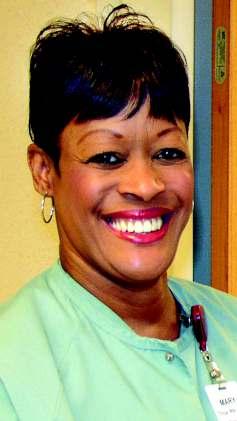
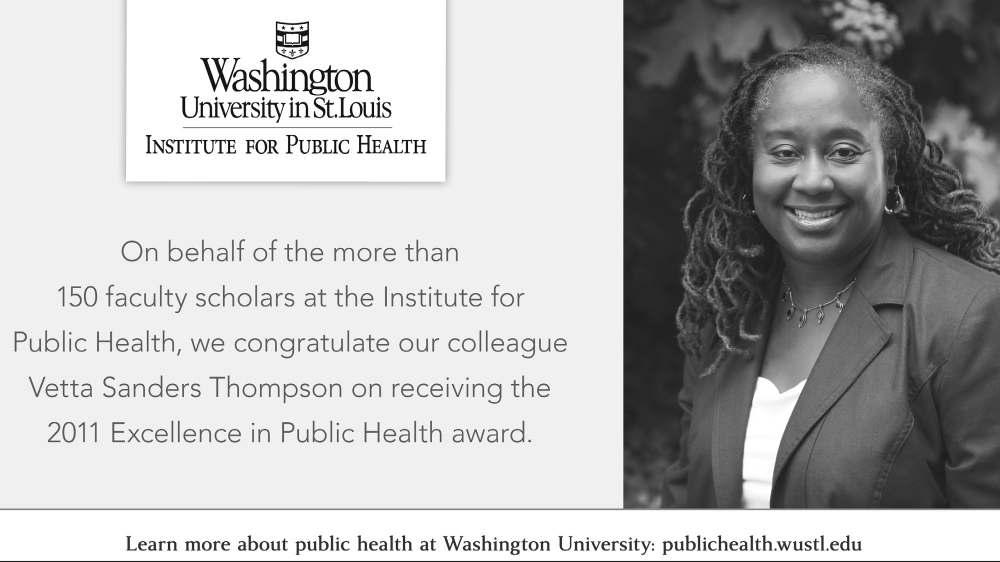
By Sandra Jordan
Of the St.Louis American
“Adolescence, we used to say, was the healthiest time of your life and now we are finding so many kids with so many issues,” said Debbie Wade-Wilson, RN, a nurse with St. Louis Public Schools.
Teenagers with substance abuse issues; environmental issues; transient home and family life and acts of gun violence are tough realities that happen to students out in the community and creep their way into the schools.
“They’ve had to deal with a lot … and it’s not their fault,” she says. “I have a lot of gunshot wound kids also … It’s nothing for them to see someone get killed in front of them.”
School nurses must deal with the after-effects.
As a multi-school nurse Wade-Wilson is responsible for the health needs of more than 1,100 students at Beaumont and Sumner high schools and the Fresh Start alterative program in St. Louis Public Schools.
“When I first started, we didn’t have
as many sick children as we have today –I don’t remember seeing so many chronically ill kids,” she explains.
There were children to care for with asthma, she says, now there are other health conditions as well.
“I don’t think I even had diabetic kids until about five years ago… but now I’m
Debbie Wade-Wilson,RN
seeing more mentally ill – diagnosed bipolar, schizophrenic kids versus the ADD. They have ADD attached to that, but they have so many more mental illness; and pregnancy.”
Her peers know her as a healthy lifestyle advocate for teens, young adults, and all students. It is said she is particularly passionate for teen mothers, having worked at the Meda P. Washington Alternative School for mothers-to-be.
She has seen her share of sprains and fractures too over the past 16 years as Wade-Wilson also oversees the athletic medical department for high school games.
Health and healing may be in the genes of this nurse. Wade-Wilson describes the days of her 95-year-old grandmother from Mississippi, Lillie Wade, as “an untrained nurse.”
“She did a lot of tending to the sick; giving them her remedies in the age that they grew up,” she explains. “They did not have a lot of medical care, so they made up their own little homemade remedies; herbal things. She was a midwife so she delivered lots of babies and she would talk about what she was doing… how she would go and help the sick; stay with the dying,” Wade-Wilson describes. “So I really think I got it from her, without really knowing it.”
Her mother saw at least one aspect of nursing coming out during playtime when Wade-Wilson was a youngster.
“When I was 5 years old, I got my 5-
See WILSON, page 24


By Sandra Jordan Of The St.Louis American
Deirdre “Dee” Washington, RN is a team leader for the Procedure Center, Post Anesthesia care unit and Endoscopy at SSM St. Clare Health Center in Fenton, Mo. Her organization and leadership has attributed to a more than 30 percent jump in patient satisfaction scores.
“Dee is a leader in every sense of the word, because she leads by example,” her nominator says. ”She is not afraid to put her scrubs on and go out into the department with her employees and start an IV; complete a pre-operative checklist; or recover a patient in the post anesthesia care unit.”
After graduating from Ritenour High School, she attended St. Luke’s Hospital School of Nursing in St. Louis. Nursing was an easy choice. Washington always liked to help people and her mother is a nurse.
“It’s really been a great field for me and I have been able to excel and I know nothing but nursing,” Washington explains.
Washington started her nursing career on a regular surgery floor at Deaconess Hospital before joining the SSM health system.
“I worked over there for 20 years,” she recalls. “I worked my way up over
there to become the charge nurse; the manager also; and then when we had the changing of the guard with Forest Park, I had some people that left Deaconess and came over here to SSM, which was SSM Kirkwood at the time.”
Good news travels fast.
“They told me it’s a great place; I should look into it and I did.”
That was six years ago.
Washington is also continuing her education, currently working toward a bachelor of science in nursing through an
online program at the University of Missouri St. Louis.
“Go back and get your degree right away,” Washington advises. “Go for the whole gamut – don’t sell yourself short. Get your degree and that will open doors for you; you can do anything with nursing. The president of our hospital is a nurse.”
At work, Washington is known as an electronic medical record “super user” and meets timely equipment and instrument needs for physicians.
Washington also contributed to the design and construction of the health center. Processes Washington helped put into place are still in use at the facility.
Several key committees at SSM utilize her expertise, including nursing peer review, network practice council, medication error reduction team, patient satisfaction and culture of service.
The culture of a faith-based hospital is where Washington and others say they live out the hospital’s mission and their faith.
See WASHINGTON, page 26
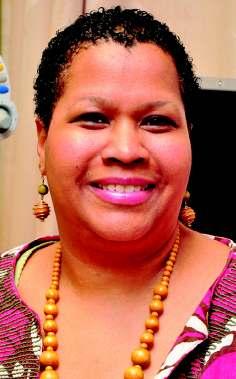
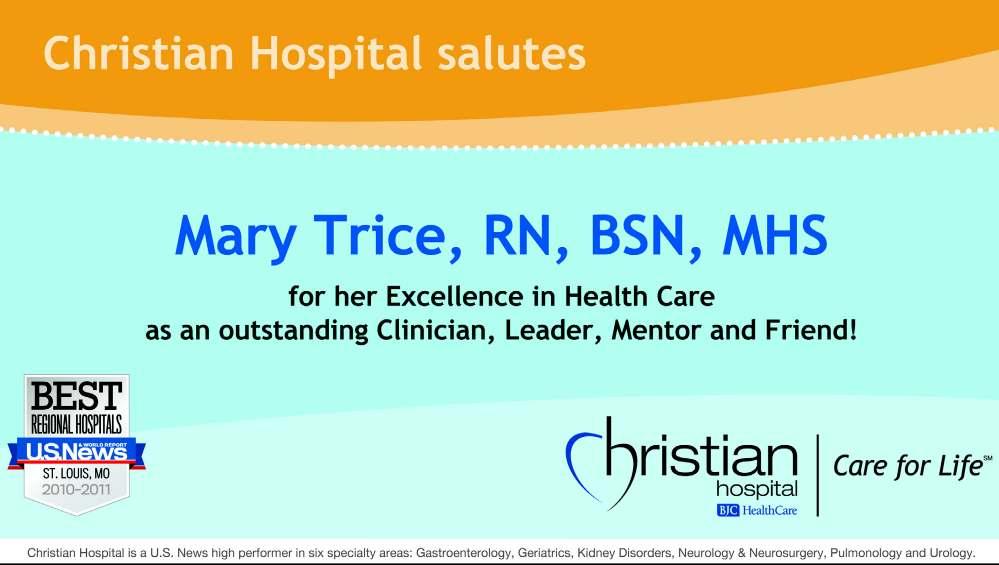
By Rebecca S.Rivas Of The St.Louis American
It’s that moment in the delivery room when a newborn lands in the doctor’s hands. The parents and grandparents light up with joy. That connection shared between the doctor and a family impassioned Jonathan R. Reed, M.D., in his 35 years of solo practice as a gynecologist and obstetrician and eight years in a public health center.
Though he has been retired for five years, people in the community continually recognize him as their physician and introduce him to the grown children he helped to deliver.
“That experience at Homer Phillips was really amazing.I still cherish those years.”
– Dr. Jonathan Reed
“After administering eight or nine months of pre-natal care and then to accompany that mother into the delivery room and experience the birth of a viable infant,” he said, “I really enjoyed that experience.”
Growing up in Chicago, Reed had an interest in science at a young age, but one experience truly shaped his career ambitions. Reed had appendicitis, which required an emergency surgery and prolonged hospital stay.
“While there, I observed the care given by the doctors and nurses,” he said. “I was so impressed with their dedication and their attentive care. I said, ‘This might be something I’d like to do myself.’”
Reed majored in pre-med at Fisk University, a predominantly AfricanAmerican institution in Nashville, Tenn. But before he could enter medical school, Reed was drafted into the U.S. Army. When he returned, he became a

Jonathan R.Reed,M.D.,has spent 35 years in his solo practice as a gynecologist and obstetrician and eight years in a public health center.
government employee and continued to take graduate courses, hoping to speed his acceptance into medical school.
“The most memorable time back then occurred in 1961 when I married Bettye, my wife, and subsequently was admitted to Meharry Medical College,” he said.
“It’s been 50 years of a very interesting career,and this year Betty and I will cel-
ebrate our 50th anniversary.”
The early years of medical school were challenging, he said.
“We were newlyweds, and we had to make many sacrifices,” he said. “It just so happened that she was employed by the Department of Psychology, and she was one of our instructors. No, I did not make an ‘A’in that class.”
During his senior year in 1965, representatives from Homer G. Phillips Hospital in St. Louis came to campus to recruit students.
“It was at this time that many hospi-
See REED, page 15
Continued from page 14
tals weren’t admitting African Americans for further training; Homer Phillips was one of the few,” he said.
“That experience at Homer Phillips was really amazing. I still cherish those years. The constant supervision, the good teaching, the excellent dispensing of medical care and the commitment of the entire staff were truly impressive.”
He loved his St. Louis experience so much, he said, that he decided to raise his family here. His three daughters all graduated from historically black colleges or universities.
Most physicians, after completing their residency training, opt to take their specialty board exams to demonstrate their knowledge and proficiency in the specialty.Reed was successfuland therefore elected to be a Fellow of the American College of Obstetricians and Gynecologistsin 1977.
After his residency and internship at the hospital, Reed joined the late Dr. Parker Word in his practice. By the mid-1970s, he opened his own office in St. Louis city and then in North County. Most of his patients were admitted into Barnes Hospital, later Barnes-Jewish Hospital.
He also became affiliated with the prestigious Washington University School of Medicine as an assistant professor of clinical obstetrics and gynecology.
Reed closed his private practice in 1996, then served eight years at Myrtle Hilliard Davis Comprehensive Health Centers as head of its OB/GYN department.
“During my time of solo practice, when I look back on it now, it was very frustrating and very trying,” he said. “I was tied to a beeper 24/7. Mothers just don’t go into labor when they are supposed to, and babies don’t wait.”
There were many times, he had to leave his family and return to the delivery room. He missed many occasions when his children had dance recitals and other events, he said.
“However, it was truly an amazing experience,” he said. “Through my practice, I realized that all people need access to medical care. Science doesn’t recognize skin color or socio-economic status.”
His focus on equality is also reflected in his work with the Unity United Methodist Church, National Assocation for the Advancement of Colored People, Alpha Phi Alpha Fraternity and Sigma Pi Phi Fraternity (the Boule’) Anniversary Club.
The medical field has changed significantly, he said. Most graduating doctors now go into group practices or work for hospitals.
“The model is changing where there is less attention to the interpersonal relationship between doctors and patients, and some of the medical decisions are handled more as administrative functions rather than by the doctor,” he said.
The upside, he said, is that doctors can spend more quality time with their families.
Reed said that in the African-American community, many patients do not seek early care in pregnancy or other health matters. In his experience, it was a financial issue.
“They were caught in the middle where they didn’t qualify for insurance or the government-supplemental programs,” he said.
“We would accept them, no matter if they had adequate coverage, partial coverage or full coverage. I am hoping with the new health-care laws that are coming on board that this problem will be served.”
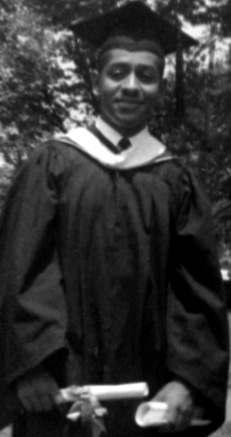

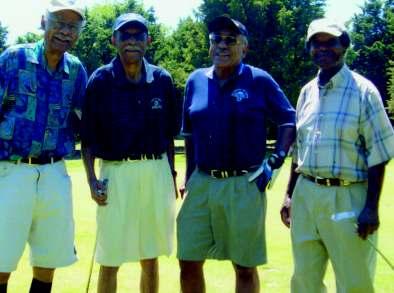



By Rebecca S.Rivas Of The St.Louis American
In a bold red suit, Teri Murray, the dean of the School of Nursing at Saint Louis University, strolled down a hallway of faces in picture frames until she found hers.
“I graduated in 1979,” said Murray, PhD, RN, associate professor.
Her index finger stopped on an African-American young woman with a white nurse cap and a big smile.
“You see, ‘Teri Clark’right there,” she said. “It’s really great to lead where you went to school because at St. Louis University, we educate the entire person – the mind, the body, the soul. That holistic education really prepared me for all of my future roles in nursing.”
Under Murray’s leadership, the School of Nursing recently received a $1 million grant to increase the student minority population, currently at 16 percent. With its mission of social justice, the university encourages Murray’s efforts in transforming the mindset around health care for underserved populations.
“Many landmark reports show that in the African-American community, we need to be able to have a workforce that is representative of the community and that workforce has to have an intimate understanding of how to provide culturally-sensitive care,” she said. “If you could move towards a populationfocused, healthcare mindset, research shows that you really can improve the overall health of the group.”
Murray always thought she was born to be a teacher, and in fact she was set on a teaching degree up until the moment she started filling out college applications.
“As I entered Northwest High School, the teachers went on strike, and the media had a lot of information about the challenges of teaching adolescents,” she said.
Murray’s sister, who was already in school for nursing, told her she’d love being a nurse. She was right, Murray said.
Murray went on to earn her Masters in public health nursing in 1993 from SLU. Her work as a public health nurse accounts for some of the most meaningful and memorable moments of her career.
“To be able to look into a person’s eyes in their home environment and

community setting and seeing the health education and promotion that you’ve done is really making a qualitative difference, that is memorable,” she said.
Another memorable moment in her career was earning a doctoral degree from SLU in 1997.
“As I’ve shared, I’ve always had a passion for teaching, but I never imagined in all my wildest dreams that I would earn a doctorate. That was a dream come true for me,” she said.
One of her proudest achievements was receiving a gubernatorial appoint-
“What I’ve learned from leadership is that it’s not for the timid or the shy.Leadership is risky business.”
– Teri A.Murray
ment to the Missouri State Board of Nursing, where she served for nine years – four of which were as president of board.
At the School of Nursing, the numbers of minority students has ranged from two percent in 2002 to 23 percent in 2006. Prior to receiving the $1 million federal grant from the Human Service Resource Administration, the school’s diversity numbers were at 16 percent.
“Now with our grant, we are optimistic that we will increase our numbers,” she said.
The school is partnering with the East Central Missouri Regional Area Health Education Center and SLU’s Area Health Education Center to reach their goal with a three-prong approach.
First, they encourage students from five area high schools to enter the SLU nursing program. They work to retain the students until graduation and finally, they prepare students for the licensure exam for registered nurses.
As a public health nurse, she saw firsthand why it’s important to have representatives from all ethnic and racial backgrounds.
“Sometimes if the people believe that they can relate to you more, they will tell you ‘Well honey I can’t afford the pills.’ And that enables the public health nurse to seek resources to move forward. Based on research, patients often do better when they see people who look like them in the health care setting.”
Murray said being the dean of the School of Nursing is a perfect alignment of her passion as an educator and the opportunity to lead. And if she’s learned one thing from her leadership role, it’s that she has to be bold.
“What I’ve learned from leadership is that it’s not for the timid or the shy,” she said. “Leadership is risky business.”
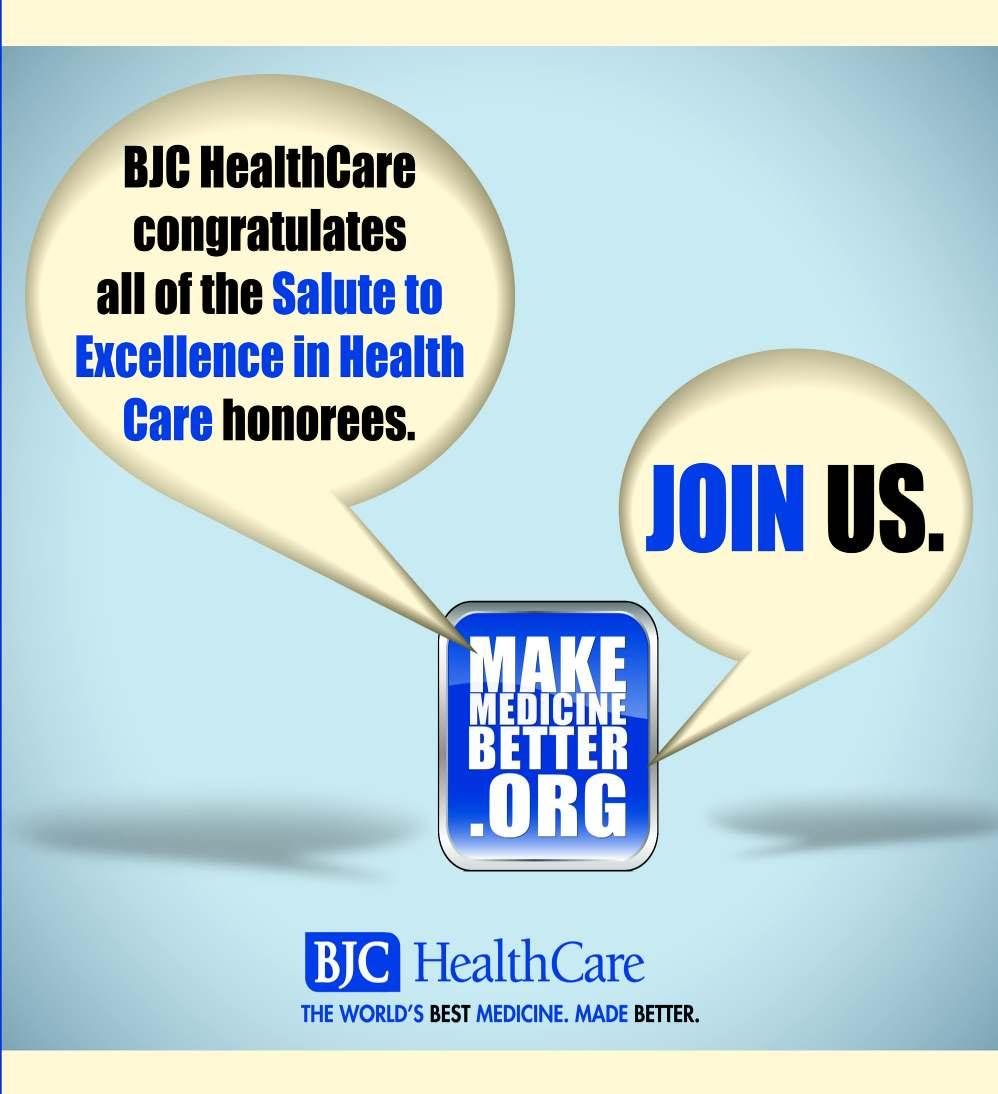
By Rebecca S.Rivas St.Louis American
Vetta Sanders Thompson, Ph.D., speaks like a minister, said her colleagues at Washington University’s George Warren Brown School of Social Work.
Thompson is an associate professor at the school and faculty scholar at the Institute for Public Health. When she tells a story, her eyes widen and her cascading braids punctuate important points as she nods in emphasis. Thompson has a 21-page resume that highlights dozens of her presentations, 70 published works and several community projects. Yet hearing her speak, it’s clear her goal is not to lengthen her resume. She is committed to ending health disparities among African Americans, particularly in cancer detection.
Raised in Birmingham, Alabama, Thompson was one of the first African Americans to integrate a previously allwhite elementary school. She entered second grade with only two other black girls in the school to lean on.
She remembers stepping into the new school and immediately noting the differences from her old school. It had a library with several librarians (not the book mobile she knew), an auditorium, a home-economics room and a physical education teacher who taught nothing else. But most of all, she noted that the books were not torn or already written in. She had been working in the whites schools’hand-me-down books.
“We were the first African Americans at this school, and we had to figure it out – and we did,” she said. “Even today, it informs my sense of where the AfricanAmerican community is and where it has to go. But I also understand how far we’ve come.”
Thompson still calls Birmingham home, even though she has lived in St. Louis for 25 years. Her experience there shaped her identity and fuels her work today, she said.

munity outreach.
“She’s very passionate about what she does, and it comes through in her personality,” Anwuri said. “She’s very committed in everything she does.”
Through the program, Thompson serves as a guest health expert on radio shows to encourage people to screen for cancers. PECaD also works with libraries and the faith community to ensure the most recent evidencebased cancer information is getting to the public.
“I like the fact that PECaD is ongoing,” she said, “and hopefully when we finish, these churches should be able to sustain that effort long after the project to end disparities is over.”
The idea is to build sustainable programs so people will always be able to get up-to-date information and know what to do to protect themselves against cancer, she said.
“Vetta has always been supportive of what we’ve been doing in terms of health ministries in the St. Louis area,” said Dr. Del Doss-Hemsley, of Faith Communities Joined for Health. “She’s been a real asset to us.”
Faith Communities Joined for Health grew out of the Brown School’s evidence-based project Body and Soul. The consortium is now developing health ministries in 15 churches with the focus of encouraging the consumption of fruits and vegetables. Working with Thompson and PECaD, the group also distributes cancer-prevention materials.
“I think things have happened because of Vetta and I think they will continue to happen because of Vetta,” Doss-Hemsley said. “It would be a loss if she left the St. Louis area.”
Thompson said her current work with the National Children’s Study –one of the largest longitudinal studies of children’s health ever undertaken –will be one of the most noteworthy efforts of her career. She will follow children from birth to age 21 to understand how their environment combined with their biology contribute to their health.
“That’s why I like what I do with my public health colleagues because it takes into account that where you live plays a role in your health,” she said. Whether it is through policy or developing the appropriate intervention communication, she aims to influence people’s access to information, foods and programs that are going to make for a healthy, high-quality life, she said.
Victoria Anwuri, project manager at the Washington University School of Medicine Alvin J. Siteman Cancer Center, first met Thompson as a master’s student 10 years ago. Now they work together in the Program for the Elimination of Cancer Disparities (PECaD), where Thompson leads com-
Having a doctorate in psychology and being trained as a clinical psychologist, she is passionate about integrating mental health into health, she said.
“I think people separate them, as if you can separate mind and body, and you cannot,” she said. “If we want a healthy population, we have to pay attention to mental health as well. I see them as one and the same.”

By Rebecca S.Rivas Of The St.Louis American
As a sophomore at Clayton High School, Rebakkah Johnson heard from her counselor about an opportunity to be a “college student” for six weeks at the St. Louis College of Pharmacy through the BESt Pharmacy Summer Institute.



Her mom was thrilled, but six weeks of science and math in the summer time was a hard sell for her. With the extra nudge of a stipend incentive, she applied and completed BESt I and II over the course of two summers.
“It was the best decision I’ve made in my life,” she said.
Not only did she enjoy learning with multicultural students like herself, but she also became comfortable with the school itself, she said. When she graduated high school, she enrolled in the St. Louis College of Pharmacy because she felt confident she could complete the program.
“I was ready for the challenge because if I went through two summers of all this strenuous work, then I thought I was ready,” she said, “and I am.”
Launched in 2008, the BESt Institute’s goal is to educate, train and
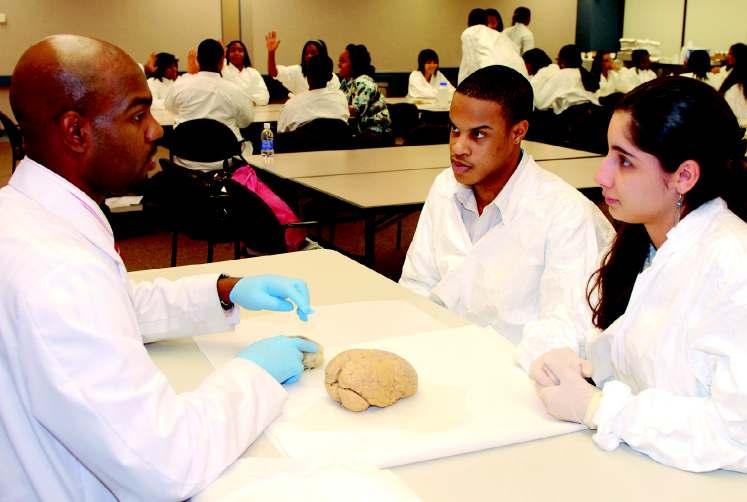
prepare multicultural students for a career in pharmacy, said Isaac Butler, MBA, PharmD, the co-founder and co-director of BESt and director of program integrity at Express Scripts Inc.
The BESt Institute is receiving this year’s Health Care Advocacy Organization of the Year Award.
The “BESt” acronym stands for Barnes-Jewish Hospital, Express Scripts and St. Louis School of Pharmacy. The leaders at the heart of the program are Butler, Steven Player, MBA, PharmD, inpatient pharmacy manager of diversity and recruitment at Barnes-Jewish Hospital, and Freddie Wills, director of diversity at the college.
Launched in 2008, the BESt Institute’s goal is to educate, train and prepare multicultural students for a career in pharmacy.
“I think the most exciting part of the program is the success we are having today,” Butler said. “One hundred percent of our students have gone on to four-year colleges and universities.”
About 90 percent of those are choosing careers in health care and 70 percent have chosen careers in pharmacy.
“Now these are all very gifted and bright students; however pharmacy is not the most promoted health care profession,” he said.
In its first year, the BESt Institute hosted 30 students. Last year it enrolled 64 students, and now offers three program levels starting with high school freshman. The institute was the brainchild of Player, co-founder and co-director. When Player began designing the program, he knew that it would only be successful with the right partners, he said.
Express Scripts and STLCOPwere natural choices, and Butler and Wills helped him execute the plan.
“Once we started developing what a potential pipeline would look like, it became clear that we needed to align
ourselves with corporate partners that had the same vision and samecommitment of corporate responsibility to the community we serve,” Player said.
Both Butler and Player are products of such programs themselves.
“My path to becoming a pharmacist and a heath professional is very similar to the students who we have in the program,” Butler said.
Butler grew in St. Louis city and attended public schools.
“I lacked a certain level of exposure and certain level of belief until I got involved in other programs like INROADS and Upward Bound. When I think about the mission of BESt, hopefully we are hoping students become what they truly want to become.”
Wills, an East St. Louis native, was an athlete in high school and college, who obtained scholarships. Knowing the challenges of finding his own way first hand, he has developed several programs to engage the youth into health-care career
See BESt, page 24



St.Louis County

Previous Lifetime Achiever Georgia Anderson (Salute Class of 2008) presents flowers to 2010 Lifetime Achiever Lula Hall,left,as her husband Floyd Hall,Jr.looks on.
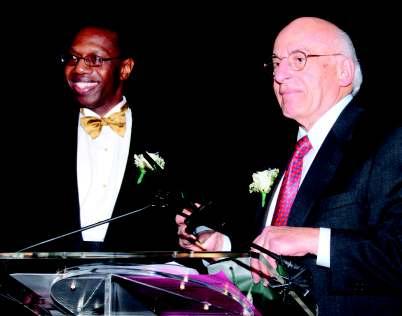
2010
Lula Hall, R.N.
Alphonse Peterson, M.D., R.N.
2009
HomerE. Nash, Jr., M.D.
Dorothy Thornton, R.N.
2008
Georgia Anderson, R.N.
Nathaniel H. Murdock, M.D.
2007
Leslie F. Bond, Sr., M.D.
Mary A.T. Tillman, M.D.
2006
Zella Harrington, R.N.
Jerome Williams,. Sr., M.D.
2005
Ella M. Bolden Brown, R.N.
James M. Whittico, M.D.
2004
Betty Jean Kerr, M.A., Ph.
Bernard C. Randolph, Sr., M.D.
2003
Amanda Murphy, R.N., Ph.D.
Frank O. Richards, M.D., F.A.C.S.
Washington University’s Dr.William Peck presents the Stellar Performer in Health Care award to Dr.Will Ross.
2002
Robert B Holloway, M.D., F.A.C.A.
Geraldine Phelps, R.N., M.S.
2001
Mildred Jamison, R.N.
William L. Smiley, M.D.
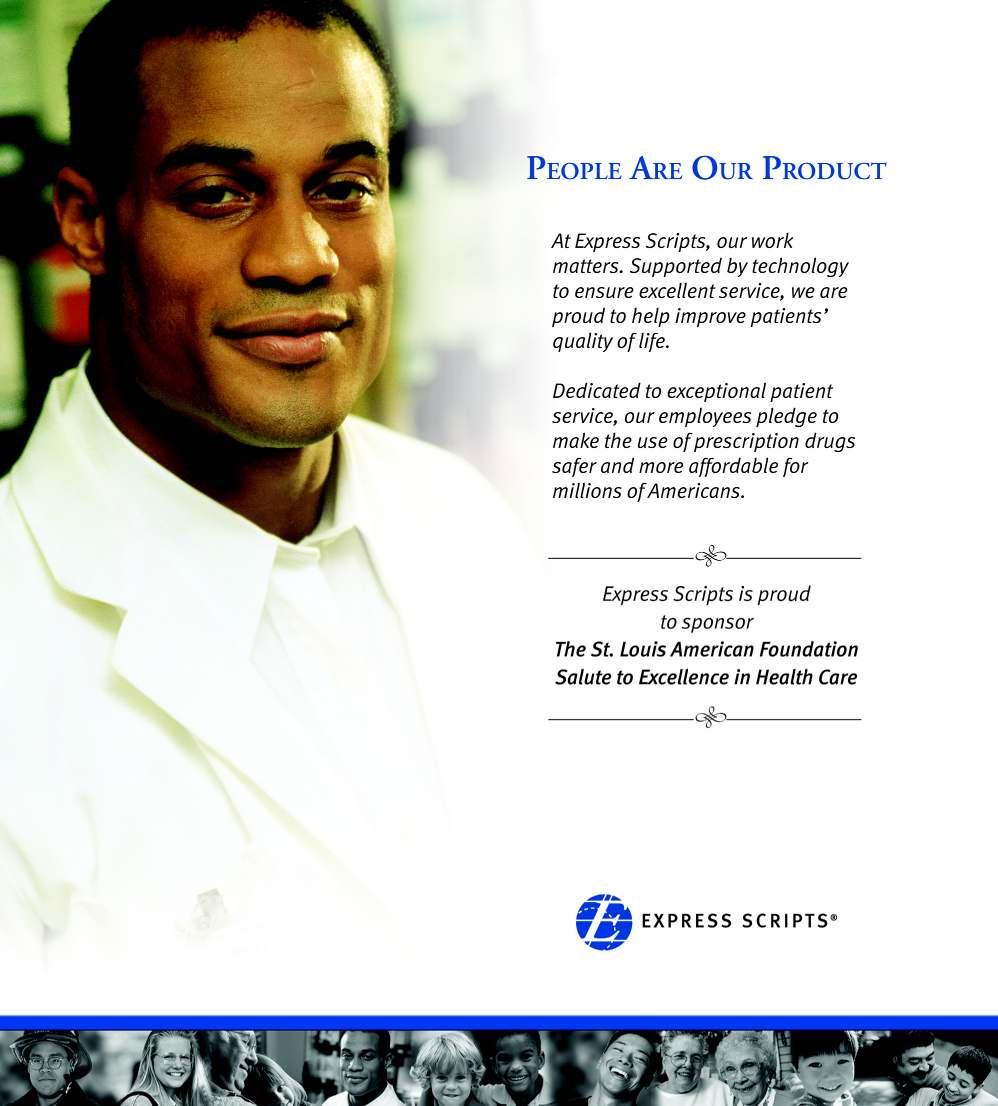
Continued from page 12
year-old shots for school, and I told my mom I wanted to be a nurse so I could give shots,” she laughs. “As I went through school, the only thing I thought about was being a nurse, because I wanted to give shots, and everybody laughed at me when I told them that–and my teachers were like, ‘okay, that’s fine.’”
She went to the Academy of Math and Science, a school that focused on engineering.
“I was encouraged by a counselor to go into engineering because I had good grades in my science; my calc[ulus]; my business and physics classes to go into engineering, but I just wanted to be a nurse,” she explains. “That was just in my heart and in my spirit.”
Wade-Wilson earned her nursing degree from St. Louis Community College - Florissant Valley and is currently completing her Bachelor of Science in Nursing through the University of Phoenix. She wants to
eventually become a family nurse practitioner, working with teen adolescent mothers.
She and her husband, G. Keith, have two sons, Keith and Deion. She is a member of Grace Church in Creve Coeur, where she sings in the choir and is a member of its prayer group.
Continued from page 7
Scott is also an active member of West End Mount Carmel Missionary Baptist Church and has an active family life.
“As I reflect, I can remember the times when I have leaned on family, friends and spiritual leaders,” Scott said.
Scott says she is always looking for ways to improve the community that she loves by identifying and finding solutions for its medical needs.
“You can never get bored in trying to help build and educate a community,” Scott said.
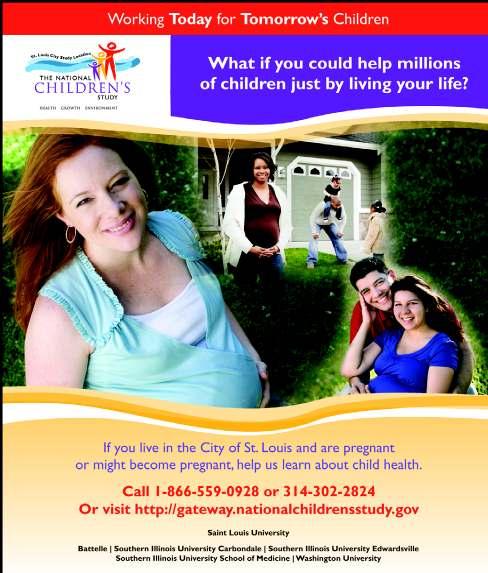
Continued from page 10
this month at Harris Stowe State University—“Sound the Alarm and Rock the Facts.”
“We had an amazing turnout; the students were really engaged and asking great questions,” she says. “It was actually so successful that HarrisStowe asked our organization back for the summer for their incoming freshmen.”
She says community partnerships made all the difference.
“I wouldn’t have been able to do that had it not been for the connections and the relationships that I built while I was at the health department,” McLeod-Steward explains. “The health department has really put me in a position to progress my career.”
McLeod-Stewart is a South St. Louis native and graduated from Roosevelt High School. She and her husband, DeAndre Stewart, have two sons, Davion and Devoun.
Continued from page 10
paths, who would normally not have exposure to such fields.
“The biggest thing that we are offering to the students is to get a real life experience of what it is like to be a college student,” Wills said. “We basically engulf them into our culture here at the college. We do not treat them as if they are high school students while they’re here.”
Johnson said what she most enjoyed was getting that inside view of what pharmacy was like.
“We got to visit Barnes Jewish and see what Dr. Player did and went to Express Scripts and saw what they were all about,” she said.
And because she was taking Calculus and English classes in the summer, she sailed through her high school classes with ease.
“I didn’t know what I was getting into,” she said. “But I met so many wonderful people and other students who were going through this with me.”



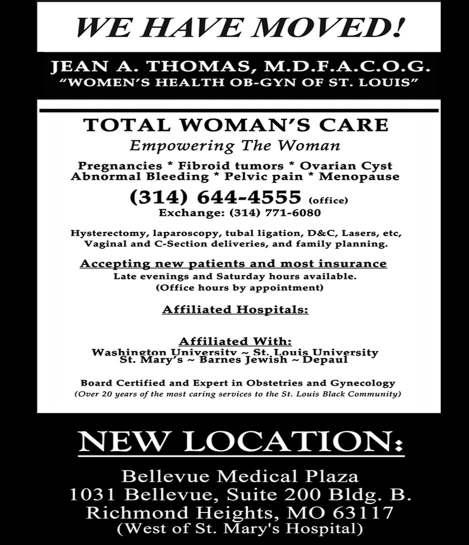
Continued from page 9
showed that we respected them to give them that freedom.”
Outside of her work at St. Mary’s, Smith is an active member of her church. She attends Washington Metropolitan AME Zion Church where she is an usher and works with both the women’s and youth ministries.
Continued from page 5
screening and awareness about HIV and AIDS.
Adams also works with Barnes Jewish Hospital’s Mobile Unit, which offers many services including free blood pressure screenings, glucose and cholesterol screenings and flu shots.
“Being a nurse has become my lifestyle, not just my job,” Adams said.
Continued from page 11
Trice says most of the time when someone comes to work there – they do not leave. She is there because she cares.
“Mary has created a shared vision and a culture of safety andawareness that has touched many lives,” Concordia adds. “She serves as a strong role model forherco-workers and a lifeline for her patients.”
Trice had a role model of her own – a mentor that nurtured her passion for nursing and patient care through leadership.
“Marge Dye was my mentor and that was how I really got started into the operating room,” Trice says. “She was the one who prepared me for managing and being a director.”
Other areas of responsibility for Trice include the GI or Endoscopy lab and the Pain Management Center.
Trice earned an associate degree in nursing at Florissant Valley Community College before earning a bachelor of science in nursing at Webster University, followed by a master’s in health science at Washington University St. Louis.
She has earned several internal awards over the years and said she always looked forward to reading about Salute Awardees in The American, never thinking that one day she would be one of them.
“It’s such an honor; I still can’t believe it,” Trice says. “I followed that, because I thought it was very important to be recognized for that.”
Trice, a Madison, Illinois native has several relatives working at BJC locations. Her sister, Leola Robinson works in human resources at Christian; niece Tanya Walker, RN works at Missouri Baptist; Trice’s cousin Angela Griggs is a child development supervisor at Christian and her cousin Roy Griggs works in materials management at Alton Memorial Hospital.
She is a proud grandmother to grandsons Devin and Dylan Trice and has a daughter-in-law, Kara. Her son Douglas passed away in 2005.
Trice serves on the Christian Hospital Shiloh Church Community Health Care committee, participating in health fairs, health care lectures; and is on the Haven of Grace Shelter for Girls committee; and was a longtime member of the Black Nurses Association.
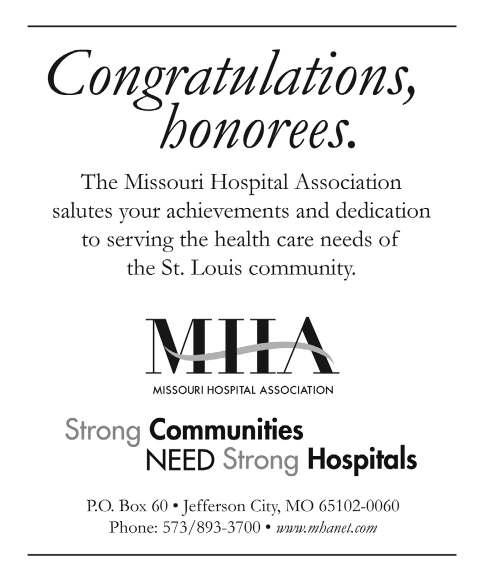
Continued from page 13
“I’ve never worked anywhere where we start a meeting with a prayer; whether it is a corporate meeting or just a regular staff meeting, just to realize why we are here,” she says.
The person who nominated her said Washington is a nurse “that I would trust my life and the lives of my family, and know that we would receive the best care possible.”
Washington is married to her high school sweetheart, Leonard. Together they have five children: Leonard III, Steven, Marcel, Rod and Jaela.
She is a member of All Souls Catholic Church in Overland, Mo.
“Even though you don’t have to be Catholic to work here, just the fact that it’s just a cohesive group and they have that faith base,” she says, “and if we didn’t have God, we would be able to do everything that we are doing.”


